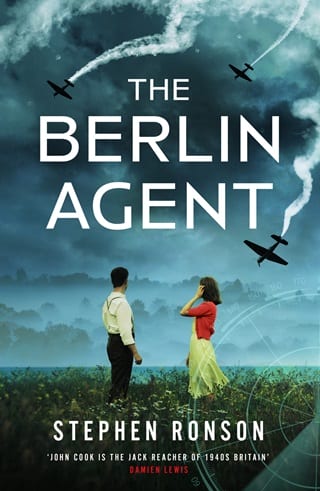5
I let them go ahead, following behind in my van, wondering what Mrs Leckie and Stan would make of it all. Probably put the kettle on and go back to their routine.
We dropped down from the Leckies’ private hilltop, took the sharp left at the bottom of the hill, then followed the lane back out, across the ford.
The men in the car in front would be trying to invent a story that would be least damaging to them. A large group of assailants. A posse whipped up by the Leckies. Young relatives. Grandsons, neighbours, soldiers.
The man with the broken arm was going to be a problem, for their story and for me. He’d clearly been in a fight and he’d clearly lost. Whatever happened with his boss, he’d end up nursing a grudge against me. He’d be telling himself I got lucky. Working himself up to instigate a repeat confrontation. I wasn’t worried for my own safety, I could fight him a hundred times in a row and win every time, but I’d seen how easily he took to violence against the weak and defenceless. If he didn’t know who I was now, he would soon. The downside of small-town life – nobody’s a stranger. I’d have to keep an eye on Mum and Uncle Nob, not to mention our two evacuees. It would reduce my own effectiveness. I was meant to be readying our defences for the upcoming invasion. Harder to do if you’ve got half an eye on protecting your own home front.
They stopped at the Uckfield-to-London road. I imagined them arguing, aware of my van behind them. Trying to decide. After a long minute, they took a right turn, back towards Uckfield, then quickly took the next left, towards Fairwarp. I’d cycled around here as a boy, but that was a long time ago. Still, I found myself anticipating the corners, and each new stretch of road looked like I’d expected it to. Like listening to a song you knew as a child, each line unlocking the following line in your memory.
They slowed as we came to another junction. A tiny -triangle of grass signifying a choice. A white finger-post in the triangle looked sorry for itself, its arms freshly amputated to confuse invading Germans. I didn’t need directions. A right would take me back to Uckfield, three miles. Left was a narrow lane with one house at the end.
They took the left, and I followed, along a sunken lane, carved into the surrounding fields by centuries of traffic. Horses, carts and cattle, churning up the mud, rain washing it away, eating into the ground year after year, sinking the roadway deeper and deeper. As we headed uphill, trees closed in overhead, forming a green tunnel.
We came out into daylight at the top of the slope, and the lane ended with two pillars, stone lions defending the entrance to a driveway. My pulse rose as we passed them, a residual effect of the last time I’d been here.
The gravel driveway led us to the front of a large villa. Double oak doors, herringbone brickwork details, leaded glass. A handsome house, built to order at the turn of the century for a London barrister looking to raise his family in the country. The car in front of me carried on, round to the back of the house, to the garages and the servants’ entrance. I didn’t follow them. I stopped by the front door.
The last time I’d come here I’d been a boy, here to ask a girl out, heart pounding and mouth dry and painfully aware I was out of my league.
Kate had been the quiet one at school. Everyone knew who she was, but nobody knew her. Clothes immaculate, a cut above the rest of us wearing hand-me-downs a couple of owners into their useful life, she sat quietly, and worked hard. When the rest of us ran out of the classroom as soon as the bell was sounded, Kate was likely to linger behind. She didn’t join in any of the playground games. She didn’t even play stoolball, which at our school was practically a religion, overseen by the headmaster who insisted we play every day, right through winter.
Kate had intrigued me. Her father was the closest thing to a rich man any of us were likely to get, and that made Kate like royalty. But most of it was her quiet intelligence, evident every time she opened her mouth to answer a teacher’s question.
One summer day, when I was thirteen, I’d got up my courage and cycled out to Kate’s house. I made it halfway down the driveway, my bike wheels sinking into the deep and luxurious gravel. I’d looked around at the manicured lawn and the topiary. I’d been a fool, I realised. Farm boys didn’t ride up to the front door of a mansion and ask the girl of the house if she wanted to go to the pictures. I saw the servants laughing in my face. Worse, I saw Kate, politely declining, running back to tell her parents so they could laugh at me over dinner.
I’d turned my bike and headed home. As I did, I’d noticed Kate at the upstairs window, looking out. I’d interpreted her expression as one of pity, but as I cycled home I’d realised she’d looked disappointed. The next time I saw Kate at school, we both pretended it hadn’t happened. That was our last year at school. I’d left to work on the farm, then off to war, and Kate had been sent away, to be finished, whatever that had involved.
 Fullepub
Fullepub 



